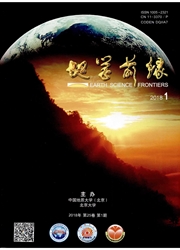

 中文摘要:
中文摘要:
喀斯特地质与生态系统是地球表层系统中的重要组成部分,其变化将对其他地区以及整个地球系统产生影响.生物地球化学循环是全球和区域变化研究的核心内容,而生态系统的演化与系统内水分和养分的生物地球化学循环密切相关。因此,我们有必要将喀斯特生态系统纳入到更大区域或全球生态系统中进行分析研究,在充分研究认识整个喀斯特生态系统物质生物地球化学循环规律的基础上,进一步研究喀斯特生态系统的全球变化响应或影响机制,为喀斯特生态系统优化调控对策和措施提供科学基础。研究生态系统演化过程中物质的生物地球化学循环规律,是研究植物适生性、物种优化配置和适应性生态系统调控机理的关键基础。在介绍前人工作基础的同时,本文全面而概括地总结了我们近年利用元素、同位素(如δ^13C、δ^15N、δ^34S、^87Sr/86Sr)示踪和化学计量学理论和方法对喀斯特生态系统中不同界面和流域中物质的生物地球化学循环及其生态环境效应的研究成果。认识到:喀斯特流域生物地球化学循环活跃,相互耦合,并与流域生态环境变化相互制约;人类活动正干预流域物质的自然生物地球化学循环过程,并导致相应的生态和环境效应;全球变化科学深化有赖于区域生态环境变化及物质生物地球化学循环的研究。这些认识是我们将来系统深入开展喀斯特以及其他流域生态系统物质生物地球化学循环研究的重要方向。
 英文摘要:
英文摘要:
Karstic geological and ecological systems are the important components of the Earth's surface system,and their changes will give impacts on other areas and even the Earth system.Biogeochemical cycling is the key subject of studies of global as well as local changes,since there is a strong linkage between change of an ecological system and biogeochemical cycling of water and nutrients.Accordingly,it is important to study the changes of karstic ecological system and its response to or impact on global change,based on a better understanding of biogeochemical cycling in a whole karstic ecological system.It is the base of further studies on plant adaptabilities and optimization of assemblage of plant species of an ecological system.Based on the previous studies,this review introduces our researches on biogeochemical processes and nutrient cycling occurring mainly at rock/soil and soil/plant interfaces in karstic ecological system by using chemical balance theory,stoichiometry and multiple isotope tracers(e.g.,δ^13C,δ^15N,δ^34S,^87Sr/^86Sr).The achieved important understandings are that the biogeochemical cycling of nutrients in karstic ecological system is active,coupled to each other and closely related to eco-environmental change,that human activities are clearly impacting natural biogeochemical cycling in catchments and result in related ecological and environmental problems,and that the studies on areal change are important for studying global change.These findings or recognitions will be the main directions leading our further studies of biogeochemical cycling nutrients in karstic and other ecological systems.
 同期刊论文项目
同期刊论文项目
 同项目期刊论文
同项目期刊论文
 Strontium isotopic compositions of dissolved and suspended loads from the main channel of the Yangtz
Strontium isotopic compositions of dissolved and suspended loads from the main channel of the Yangtz Study of a coupled model of water hydrodynamics and water quality for YuQiao Reservoir of Haihe Rive
Study of a coupled model of water hydrodynamics and water quality for YuQiao Reservoir of Haihe Rive Geochemistry of the dissolved load of the Changjiang Basin rivers: Anthropogenic impacts and chemica
Geochemistry of the dissolved load of the Changjiang Basin rivers: Anthropogenic impacts and chemica Assessment of the Sources of Nitrate in the Changjiang River, China Using a Nitrogen and Oxygen Isot
Assessment of the Sources of Nitrate in the Changjiang River, China Using a Nitrogen and Oxygen Isot Assessment of atmospheric sulfur with the epilithic moss Haplocladium microphyllum: Evidences from t
Assessment of atmospheric sulfur with the epilithic moss Haplocladium microphyllum: Evidences from t Synchronous variations of precipitation and temperature at Lake Qinghai, NE Tibetan Plateau during t
Synchronous variations of precipitation and temperature at Lake Qinghai, NE Tibetan Plateau during t Mosses indicating atmospheric nitrogen deposition and sources in the Yangtze River drainage basin, C
Mosses indicating atmospheric nitrogen deposition and sources in the Yangtze River drainage basin, C Geochemistry of dissolved inorganic carbon and carbonate weathering in a small typical karstic catch
Geochemistry of dissolved inorganic carbon and carbonate weathering in a small typical karstic catch Chemical and strontium isotope characterization of rainwater in karst virgin forest, Southwes China.
Chemical and strontium isotope characterization of rainwater in karst virgin forest, Southwes China. Rare earth elements patterns in the karst terrain in Guizhou Province, China: Implication for water/
Rare earth elements patterns in the karst terrain in Guizhou Province, China: Implication for water/ Stable sulphur and nitrogen isotopes of the moss Haplocladium microphyllum at urban, rural and fores
Stable sulphur and nitrogen isotopes of the moss Haplocladium microphyllum at urban, rural and fores Sulfur isotopic composition and source identification of atmospheric environment in central Zhejiang
Sulfur isotopic composition and source identification of atmospheric environment in central Zhejiang Hydrogenchemistry and dissolved inorganic carbon isotopic composition on karst groundwater in Maolan
Hydrogenchemistry and dissolved inorganic carbon isotopic composition on karst groundwater in Maolan Atmospheric total gaseous mercury (TGM) concentrations and wet and dry deposition of mercury at a hi
Atmospheric total gaseous mercury (TGM) concentrations and wet and dry deposition of mercury at a hi Elevated atmospheric deposition and dynamics of mercury in a remote upland forest of Southwestern Ch
Elevated atmospheric deposition and dynamics of mercury in a remote upland forest of Southwestern Ch Continuous degradation of 2-naphthol and its metabolites by coupling Aspergillus niger with Bacillus
Continuous degradation of 2-naphthol and its metabolites by coupling Aspergillus niger with Bacillus Fe isotope compositions of natural river and lake samples in Karst area, Guizhou province, SW China.
Fe isotope compositions of natural river and lake samples in Karst area, Guizhou province, SW China. Seasonal variations of sulfur isotopic compositions of dissolved SO42-in Aha Lake, Guiyang and their
Seasonal variations of sulfur isotopic compositions of dissolved SO42-in Aha Lake, Guiyang and their Anthropogenic Inputs of Boron into Urban Atmospheric Environment: Evidence from Boron Isotopes of Pr
Anthropogenic Inputs of Boron into Urban Atmospheric Environment: Evidence from Boron Isotopes of Pr 期刊信息
期刊信息
